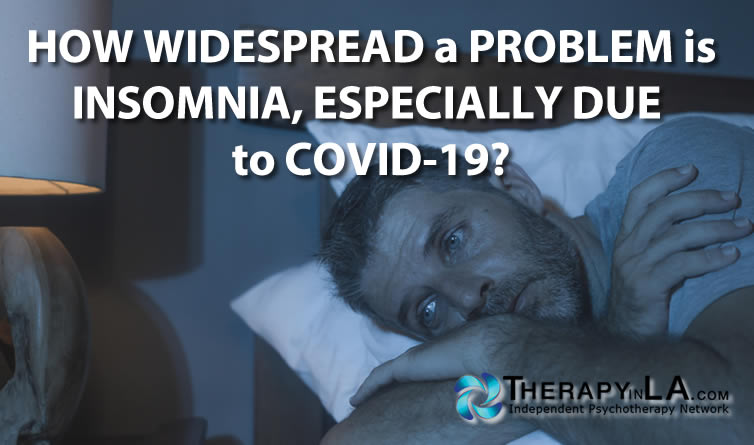HOW WIDESPREAD a PROBLEM is INSOMNIA, ESPECIALLY DUE to COVID-19?
HOW WIDESPREAD a PROBLEM is INSOMNIA, ESPECIALLY DUE to COVID-19?
By Alan M. Solomon, Ph.D.
The American Academy of Sleep Medicine reports that 28% of Americans experience some negative impact from insomnia (https://aasm.org/clinical-resources/provider-fact-sheets/ ). “Chronic insomnia” means that someone has trouble falling asleep or staying asleep, or repeatedly wakes up earlier than they’d like. These difficulties and daytime consequences occur at least three times a week for a minimum of three months. Jennifer Martin, Ph.D., the president of AASM, notes, “Chronic insomnia is a serious public health problem associated with numerous health and safety risks that can impact not just how a person sleeps at night, but also how a person feels or functions during the daytime.”
Daytime issues include:
- Fatigue or sleepiness
- Feeling Dissatisfied with sleep
- Trouble concentrating whether it be in school or at work
- Feeling depressed, anxious, or irritable
- Low motivation/energy.
It is more common in women than men. Longer-term risks include depression, anxiety, substance abuse, and automobile accidents, as well as higher risks of Alzheimer’s disease or type 2 diabetes. Work and/or school performance suffers, with increased likelihood of accidents or errors. Health care costs are higher for people with chronic insomnia. When insomnia becomes a more chronic, ongoing issue with some of these effects, some kind of help is needed.
The survey of the Academy found that 64% of Americans are using sleep aids or other substances to provide relief from sleep issues. Prescription medications are used by 23% of these individuals, melatonin by 27%, and 20% use marijuana or CBD. The COVID pandemic has prompted an increased use by 37% of individuals who use sleep aids, one indication of how the pandemic has impacted sleep disorders. The CDC reports that melatonin use among children increased by 530% from 2012 to 2020.
Guidelines from the Academy suggest that melatonin is not an intervention of choice for chronic insomnia for adults, nor for children. Cognitive behavioral therapy is a well-supported intervention.
CBT includes setting a consistent sleep schedule and getting out of bed when struggling with sleep onset. Working on anxious thoughts about sleeplessness is also a part of this therapy.
While medication is often a first strategy, it needs to be individualized for each person, carefully monitored, and only used for short-term relief. CBT, with an experienced therapist, can be quite effective, often in a limited number of sessions.
Alan M. Solomon, Ph.D. is in private practice in Torrance, CA. A member of the Independent Psychotherapy Network, he can be reached at 310 539-2772 or dralanms@gmail.com In-person or telehealth sessions are available.
Copyright 2022 by Alan M. Solomon, Ph.D.

